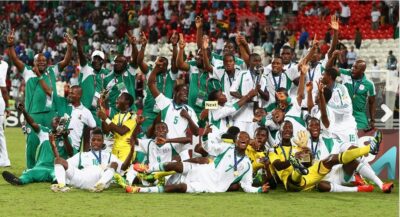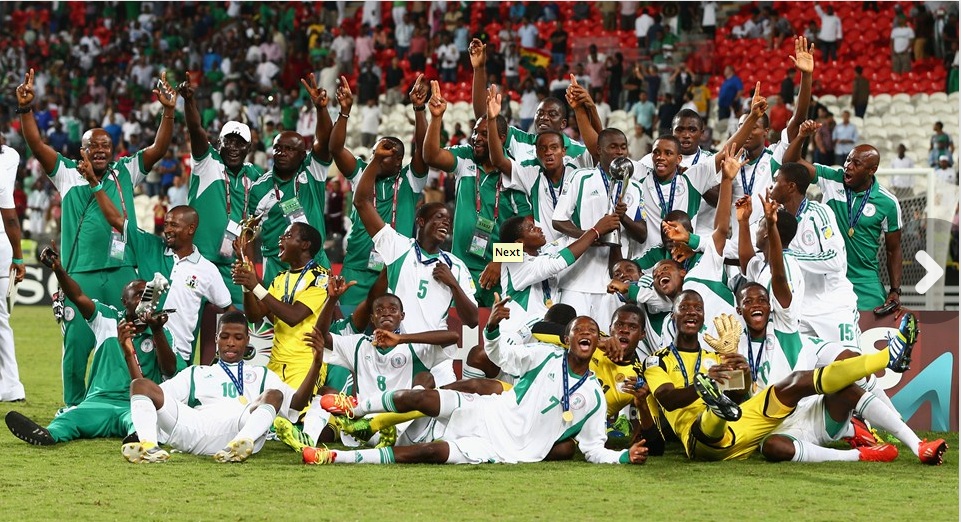The FIFA U-17 World Cup UAE 2013 proved to be a joyous celebration of football, featuring exciting matches and stunning results. In the end, it was the young Nigerians who claimed the trophy by overcoming Mexico in the final.

In so doing, the Africans became the only country to win the tournament four times, surpassing the achievements of Brazil, crowned champions on three occasions. The Golden Eaglets showed once again that, in this age category, they are a global force.
Nigeria put in remarkable performances from start to finish, remaining unbeaten throughout the event, which culminated in their 3-0 triumph over the Mexicans in front of a raucous crowd at Mohammed Bin Zayed Stadium in Abu Dhabi.
Sweden also raised eyebrows, defeating Argentina 4-1 in the match for third place, in what was their first-ever appearance in the competition. Intriguingly, the three teams that qualified from Group F finished first, second and third.
Prodigious performances and stunning surprises
Prior to the start of UAE 2013, Brazil and Nigeria found themselves among the favourites, mainly due to their three previous successes at junior level. Mexico were hoping to defend their 2011 title, and thus become the first team to win back-to-back tournaments since Brazil in 1999.
The South Americans and Africans advanced in impressive fashion from Groups A and F respectively, enthralling the watching fans with several spectacular goals.
Elsewhere, Japan dominated Group D by winning all three of their matches, but they suffered a surprise reverse to Sweden in the Round of 16. European champions Russia also fell by the wayside at the same stage, while AFC U-16 Championship winners Uzbekistan were ousted by an opportunistic Honduras side.
Looking back on the tournament, Rafael Salguero, Chairman of the Organising Committee for the U-17 World Cup, said: “We saw some high-quality matches. The teams were well prepared from a physical and technical point of view. This competition serves as a springboard for talented young players; it helps them to make progress, both on and off the pitch.”
Future stars brimming with ambition
UAE 2013 created history by supplying the most goals at a U-17 World Cup since the contest was launched in 1985. There were 172 scored in total, an average of 3.44 per match, outdoing the previous benchmark set at Korea 2007 (which was also won by Nigeria).
Consequently, there were numerous pretenders to the adidas Golden Boot, which was awarded to Sweden’s Valmir Berisha, whose seven goals were enough to finish just ahead of Nigeria’s Kelechi Iheanacho and Brazil’s Boschilia in the standings.
Iheanacho will have consoled himself with the capture of the adidas Golden Ball, an accolade he richly deserved after scoring six goals and setting up seven more. Brazilian midfielder Nathan came second in the voting, due largely to his exploits during the group phase, while Mexican forward Ivan Ochoa finished third.
Speaking to FIFA.com, Iheanacho reflected on the prestigious award: “I feel good, I feel good, I feel good! I don’t know if I can find the words to say what I’m actually feeling. I can’t even tell what I’m feeling because I’m feeling a millions things at the same time. I’m feeling love for my teammates and my family and my country. I’m on a high from winning the World Cup and the Golden Ball.”
An unforgettable event
Inhabitants of the United Arab Emirates are not likely to forget this year’s FIFA U-17 World Cup anytime soon, especially the Nigerian supporters, who accompanied their heroes to Al Ain, Dubai and the capital Abu Dhabi, scene of their ultimate victory. Their chants after each Nigerian goal reverberated around the Emirati arenas, creating a fabulous atmosphere.
Honduras’ players are also likely to remember the event, as it proved quite historic for Los Catrachos. Following their first-ever victory at the U-17 World Cup, against the host nation in the opening match, the Central Americans went on to finish second in Group A and reach the quarter-finals.
Disappointments and revelations
The biggest letdown surrounded the performances of the UAE, who lost all three of their encounters and exited the competition with little more than a whimper. Croatia, meanwhile, were expected to qualify from Group C, but ended up on the first plane home instead, pipped by Russia to the final spot allocated to third-placed teams.
Slovakia, on the other hand, will be delighted by their showing, as they reached the Round of 16 at the first time of asking. They were eventually knocked out by the Uruguayans, who subsequently fell to Nigeria in the following round.
The elimination of highly-fancied Brazil at the quarter-final stage represented one of the biggest surprises of the competition. As for Argentina, their adventure came to a halt in the semi-finals. Sebastian Driussi and Co then suffered a resounding loss to Sweden in the third place play-off.
Titanic trio
For the first time in the history of the U-17 World Cup, three teams from the same section – Nigeria, Mexico and Sweden (Group F) – managed to reach the semi-finals. Argentina, unbeaten up to that point, completed the last-four line-up, but lost 3-0 to Mexico. In the other semi-final, Nigeria saw off Sweden by the same scoreline.
The final, watched by 20,000 fans in Abu Dhabi, provided an opportunity for the Golden Eaglets to confirm their superiority in this age category, one they grasped firmly by beating Mexico 3-0, having already demolished the same opponent 6-1 during the group phase.
Nigeria’s coach, the colourful and freedom-loving Manu Garba, was confident of victory, as he explained to FIFA.com prior to his charges taking to the pitch: “No defence can stop us. We know that the U-17 World Cup is a unique kind of competition, but our attack is fantastic. When our offensive players are on form, they can break down any defence.”
Garba’s words proved prophetic, and his players triumphantly carried him around the Mohammed Bin Zayed Stadium pitch on their shoulders as they joyously celebrated another memorable U-17 World Cup success.
Participating nations
Argentina, United Arab Emirates, Brazil, Sweden, Iraq, Morocco, Mexico, Austria, Japan, Uruguay, Uzbekistan, Iran, Italy, Panama, Tunisia, Russia, Slovakia, Venezuela, Croatia, Canada, Côte d’Ivoire, Nigeria, New Zealand, Honduras.
Ranking
1. Nigeria
2. Mexico
3. Sweden
4. Argentina
Host cities and stadiums
Al Ain (Khalifa Bin Zayed Stadium), Fujairah (Fujairah Stadium), Ras Al Khaimah (Emirates Stadium), Sharjah (Sharjah Stadium), Abu Dhabi (Mohammed Bin Zayed Stadium), Dubai (Sheikh Rashid Stadium)
No. of goals
172 (an average of 3.44 per game)
Number of spectators
318,108
Top scorers
- 7 – Valmir Berisha (SWE)
- 6 – Kelechi Iheanacho (NGA)
- 6 – Boschilia (BRA)
Awards
- adidas Golden Ball: Kelechi Iheanacho (NGA)
- adidas Golden Shoe: Valmir Berisha (SWE)
- adidas Golden Glove: Dele Alampasu (NGA)
(Story copyrights: FIFA.Com)


